What Impact Might Hindu Polytheism Have Had on the Development of Indian Art?
Polytheistic Hindu Identity: A Heritage of Divine Enlightenment
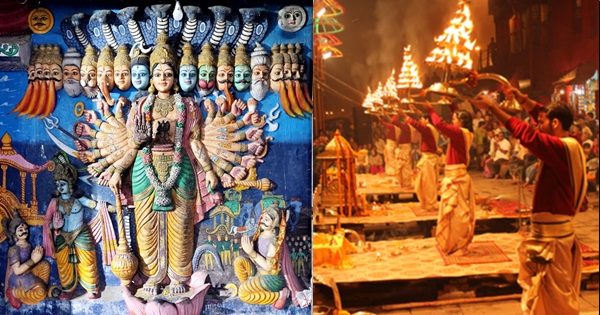
It is only endless. The numerosity of apologism. The perpetual land of subtle ideological subservience in which nosotros Hindus have lived in the past, and in which most of usa still continue to alive today. The fact that we are required to consistently justify this precious selfhood of ours; a distinctiveness that is the heritage of millennia of divine enlightenment, across fourth dimension and infinite and all other dimensions, to those who obstinately refuse to sympathize it in the start place, is infuriating.
This selfhood, this uniqueness, and this cultural-religious identity is what has sustained united states of america; is what has prevented u.s. from turning into the egotistical bigots we come across elsewhere. Those bigots, who have waged psychological pogroms and caused literal bloodbaths only because those who they slaughtered like vegetables worshipped a dissimilar God. Concepts of tolerance, accord and dignity were conflicting to them, some concepts which are the foundational rocks upon which the Indic Hindu order and civilization was consolidated.
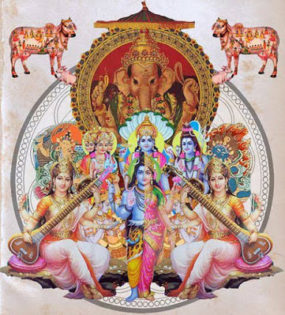
Hindu pantheon of deities; Image source: Google
In that location are several such facets of our beautiful multitudinous civilisational character, which we find burdensome, and consider them elements which require an apologetic attitude or a justification, as if it qualifies every bit a vice or a sin, instead of a stiff, concrete, determined pride and courage, to wear that characteristic as a bluecoat of honour.
You might exist getting the hint every bit to where I'thousand getting at, merely nevertheless the aforementioned statement might seem cryptic. So, what are these elements of our glorious tradition that we are inadvertently, and unconsciously, ashamed of? And reluctant to happily accept and welcome?
Well, the answer to that is a manifold ane. At that place are several cruxes which come up under this mindset. Moorti Puja, certain rituals, specific ideologies, to name a few. The first one will exist elaborately discussed by me in my next blog, however the one which is in focus for the current 1, is one particular feature of our Indic Hindu gild, that all the same, alongside Moorti Puja, continues to perplex and invite undeliberate as well equally conscious disdain from certain members of non just our nation, simply too those individuals away and everywhere else, Sanatani and not-Sanatani alike, who have failed to empathize the depth of philosophy which they uneducatedly shame and jeer at. And that philosophy, is polytheism.
What is Polytheism?
Polytheism, as stoically divers by the Oxford Dictionary, implies the conventionalities or worship of more than one God. For a mere singular sentenced definition, that is accurate, and true for the instance of Sanatan Dharm as well, since we definitely practise believe in more than one God or Goddess. Nonetheless, irrespective of how many explanations of polytheism nosotros read or encounter anywhere, none of those explanations have always conveyed to united states of america or are capable of carrying to us the bona fide essence of polytheistic Hinduism, or simply polytheism alone.
And why does this happen? It is considering the ones writing those definitions and explications are either mostly monotheistic Abrahamics, who would obviously write with a bias against polytheism, and towards their monotheistic belief, or otherwise are not-religious academicians who harbour a disdain and lack of understanding of religion in full general, or in a 3rd case, are Indian Libertarians who neither possess the knowledge about Hindu Polytheism, nor the desire to acquire that cognition.

Excerpt from This sociological thesis apparently denounces pagan polytheism equally mere "fetishism" whose adherents mindlessly worshipped inanimate objects by because it supernatural, devoid of any understanding of science. Moreover, it condescends polytheism equally a belief having "defoliation" and "mental contradictions", and eulogises monotheistic conventionalities as the one which was a resultant of "thinking and rationality" and that it was "the climax of theological phase of thinking", thereby implying that heathen polytheism has absence of reasoning and logic and that information technology is inferior to monotheism, and is a religion of disorganisation and a chaotic, unscientific heed. Such is the bookish discrimination confronting infidel polytheism and Hinduism
I classic instance of this sort of academic bias against polytheism and hence subsequently Hinduism, is revealed to usa from the sort of bones teachings regarding polytheism we receive in educational institutions and elsewhere. In a sociological thesis I had read, which dealt with the subject of religion, it was quite audaciously mentioned that the polytheistic organized religion was a sign of the disorganised human mind which worshipped almost everything they could lay their eyes on, whereas the monotheistic religions were systematic religions of organisation and an orderly fashion. Hence, the clear academic discrimination against Hinduism and polytheism is absolutely undeniable, every bit it quite plainly demonises a worship that was the nigh ancient and had the virtually beautifully accurate character.
We westernised Indians, all the same oftentimes unfortunately following in the footsteps of our quondam British masters, quite incorrectly assign the quality of backwardness and regressiveness to that which is old and aboriginal. Hence, in accordance to the restricted Western mind, which the liberal intelligentsia of our country oftentimes emulates, any organisation that is earliest or traditional, automatically corresponds to being backward, underdeveloped or unsophisticated. Hence, every attribute of aboriginal civilisations was condescended past the Western listen, wittingly and unwittingly, and one such aspect was organized religion. So, the religious character of these civilisations of antiquity too was profoundly despised by shunning them equally "barbaric", "heretic heathenry", and branding the nature polytheist worshippers as "satanic". Even so, this theory is not fifty-fifty remotely shut to the truth. If we were to compare the ancient pagan (pre-christian and non-Abrahamic) polytheist civilisational societies with those of not-infidel ones, we would observe the sheer desperate contrast of the level of scientific and spiritual advancement and development of these two societies, with the former pagan civilisations enjoying a loftier degree of social, economic, scientific and cultural progress, whereas the latter ones dwelling in a stagnant era of dark ages, devoid of scientific cognition and spiritual enlightenment.
In simpler words, if we were to take the case of Europe itself, we witness the dramatic differentiation betwixt the level of wholistic sophistication the aboriginal polytheistic pagan Greek culture had and that which medieval England did. The quondam formulated complicated mathematical theorems, while the latter believed that the sun revolved around the globe. So the difference is quite noticeable. And this was not just in the case of ancient Hellenic republic, merely also in that of the Aztec, Maya, Inca civilisations, Mesopotamia, Egypt, aboriginal Chinese and E Asian societies, and to save the best for last- our ain Mother India.

Stonehenge; even ancient Europe was pagan before the imposition of Christianity, and parts of Europe in the modern world besides have witnessed pagan revivalistic religious movements. Prototype source: 2ch.hk
Why were Pagan Polytheists so avant-garde?
Now, the looming question that would naturally arise in the minds of anyone who reads this, is why did such a stark difference occur in the kickoff place? Why is information technology that the polytheistic pagan societies were so advanced?
This is because of ane reason: the liberation of the spiritual mind.
For the pursuit of scientific and socially progressive endeavours, there is needed the existence of a very significant pre-requisite, and that is a broad-minded, undogmatic, intellectually liberal character of the members of that club. The mind is simply an element of the soul or the spirit of the homo in which it resides. Hence, the nature of the soul, which is the accented whole of the human existence, determines the temperament of the mind which that being possesses. If the soul is rendered devoid of its divine enlightenment, and is moulded to remain restricted and be coerced to live with innumerable constraints, so its touch on the mind of that person would automatically be extremely negative in nature.
The mind will naturally lose its capacity to recollect across all sorts of superstitions and fanatical beliefs, information technology will be left incapable to achieve spiritual consciousness and a sense of permanency of inner peace and tranquility, and the moment the heed is encaged, through casuistic, unreasonable religious dogmas and credos, that is the exact moment the mind loses perception of elevated, avant-garde concepts of scientific discipline, and social frameworks, even constructives of socio-political welfare for that thing. All aspects of civilisation volition undoubtedly suffer because of this since it is the mind that has birthed that civilisation, and restriction of the soul and mind is jump to bring ruin to the culture.

The Soul or the Aatma is to be freed from fanaticism and dogmas which restrict it. Until the Aatma is complimentary and liberated, the mind and the human civilisation volition never experience prosperity. Image source: Gerry O Connor (twitter)
So, how is the soul, and then subsequently the mind, encaged? Through stringency of religious norms.
Religious norms which dictate simply one, stringent concept of the divine. Religious norms, which preclude the intellectual, and and then the subsequent spiritual expansion of the listen, by restricting it simply to a monolithic, singular perception of what is sacred or holy. This is an extremely exclusivist attitude that was completely absent in pagan polytheist societies. And why so? The simple reason behind this was that pagan polytheists saw the divine, the sacrosanct in anything and everything. From the lakes to the trees, from the wind to the earth and fire, everything was holy. Then the concept of divinity was non restricted to one detail form or shape or structure, as the pagans readily and quite warmly welcomed the various, innumerable kinds and types of divine beings, equally independent identities, which possessed a multifaceted beauty in several abstract and ineffable structures and dispositions.
Then how did this pb to spiritual enlightenment? Naturally, because the second the heed and soul are opened up to the conception of the infinite, endless, innumerable divine, that's the verbal moment the mind and soul become familiar with the infinite possibilities of the universe and all that information technology encompasses, such every bit nature, and moreover the listen especially understands the underlying value and worth of every single piece of substance that it otherwise would have dismissed as a mere inanimate material. By realising the divinity that resides within every niggling entity, the pagans inculcated within themselves or rather attained the highest psycho-sentimental plane there exists, the plane of love, respect and humility, for everything they witnessed, heard, understood and felt. And honestly speaking, what can exist more than cute, than harbouring a loving, respectful and humble temperament for the world that we have been blessed to live in? What tin can possibly be more than cute than to accept and welcome, and run across the superlative dazzler of the supreme divine that graces every little thing? What tin more than surreal than to live one'due south life as a divine being, alongside seeing and appreciating the glorious divinity that exists inside each beingness? And what tin can be more than divine than dear itself? Different what certain faiths state, pagans take always recognised even the about minuscule, and also the invisible phenomena and force every bit divine and worthy of exaltation. Information technology is an extremely elevated, and superior feeling, that breaks all the inconspicuous barriers which block heed and soul, and allows the internal beingness to transcend to a new, aware reality, which has unlocked the divine inside. The Pagans were not arrogant enough to consider themselves and so powerful that they can fifty-fifty restrict the number of the divine to only one unmarried form, numeric or nomenclature. They had, and still have the humility to acknowledge that they should cherish divinity in all the unlike identities, numbers or structures information technology wants to exist recognised in. Furthermore, the belief in more one God automatically translated to a circumstance where diversity of divinity was being worshipped.
And, as I have already explained before, spiritual enlightenment effectuates all other forms of illumination. Then consecrating multifariousness of divine, directly conjures up a scenario where diversity in all other spheres, such as social, intellectual, political, cultural, and even religious, is not just acknowledged, merely also loved, accepted and adored, as the tolerance of multiplicity is a sign of a broad, educated and sophisticated mind. The classic instance that should be noted hither would be our ain motherland'south civilisation. Such dissimilar colourful cultures, ethnicities, languages, attires, cuisine, religious ideologies, and and then on, all starkly singled-out from the rest, but all living and thriving together in beautiful harmony. This would not have been possible if there a lack of mindful tolerance or to be more than specific, love, for each others' identity and uniqueness.
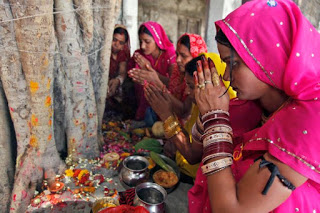
Beautiful Hindu ladies worshipping a tree, in a festival popularly known equally Vat Purnima, which only goes to show that nature worship is an essential chemical element of Hinduism and other pagan polytheist religions, every bit Hinduism as well is heathen. Pagans cherished divinity in all forms, and Hindus too love Mother Nature worship all Her elements and considered Her sacred. Image source: Google.
All these factors led pagan societies to go the wonder that they were and notwithstanding are.
What is Hindu Polytheism? And why should we cherish it?
As I take mentioned earlier, Hinduism too comes under the umbrella term of Paganism. Simply considering of the expansive character of paganism that I have discussed in depth earlier matches entirely the concepts embedded inside the variegated philosophies of Sanatan Dharm. Hence, that makes us polytheistic as well, since we have many cute Gods and Goddesses. However, there are, unfortunately, some individuals who unintentionally misinterpret and subsequently, misportray Hinduism equally a organized religion which does not believe in many Gods, but one God who has many forms, and often accept refuge nether the profound teachings of Advait Vedant to substantiate their opinion. Well, to their surprise, Advait Vedant says anything but this. And it is not their fault that they think so, because this perception of Hinduism is birthed from the disdainful attitude some religions accept regarding polytheism, and hence to escape any such condescension, a section of Hindus tries to identify itself as the practitioner of a religion that is actually, genuinely monotheistic, only has a polytheistic exterior. This is a classic case of apologism. Exactly what I was talking about earlier.
The sense of shame and guilt to identify as proud pagan polytheists and hence to have to "justify" the organized religion to those who don't even care well-nigh it by distorting the original teachings of the religion to gratify those bigots who ultimately will not alter a unmarried viewpoint of theirs regarding Hinduism. This country of inferiority complex is what we Hindus need to rise in a higher place. At that place should not be an iota of hesitation in albeit and accepting our pagan polytheist identity. Just to practice so, we need to first empathize as to what this identity is in the commencement place.
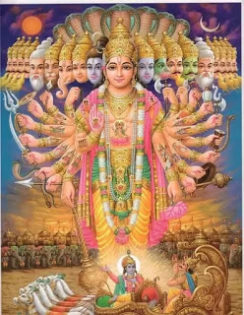
Shri Krishna in his infinite, universal form; image source: Google
How is Hinduism polytheistic? As I mentioned earlier, because at that place prevails the beloved veneration of splendidly infinite Gods and Goddesses, only like the infinite Brahman. Now, the biggest looming question would be, as to what is the Brahman? This particular concept, rather Truth, has an inexplicable depth to it, quite naturally, as it was extensively discussed in the Upanishads, and fundamentals of which were established in the Vedas. The Brahman is the accented, omnipresent, timeless, changeless, eternal reality which is inexplicable. Information technology is a aeroplane, a land, a realm of heightened divine spiritual consciousness which rests and resides in every being, even the groovy Gods themselves.
It is the supreme divine forcefulness of the Ultimate which binds the states all in a countless, limitless bliss. Brahman is the highest, greatest Truth of the Gods and Goddesses, which has been endowed to us intrinsically by the same Gods, to be learnt and dwelled in, to exist accepted and loved. It is the divine everflowing transcendental ocean in which every existence can swim forever. It is that realm with which the Jivaatama or the Soul merges upon attaining Moksh, and is freed from the circle of life and death, and is one which the Gods. That's why our revered Upanishads teach united states of america to attain the Brahman within- Aham Brahmasmi, which ways that every living existence is the Brahman in itself.
This is what our sacred Vedas, Vedant, and Upanishads say.
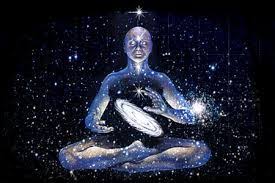
Brahman – the Eternal Ultimate; source: Pinterest
Now what often happens is, that quite a few Hindus misunderstand this Accented Reality that is Brahman, as the Supreme God of which all the other Gods and Goddesses are a course. That is quite wrong. These concepts and philosophies of Sanatan Dharm are extremely sombre, and they require in-depth comprehension. Brahman is not the Omnipotent Deity which has produced all the other Gods. Rather it's quite the opposite, if I were to say. Brahman is the Absolute Divinity that the Gods and Goddesses protect and possess. To say that the Gods were a mere course of some other god would be quite disrespectful and derogatory to the magnificent deities of our cute Hindu Pantheon. Every God is a sole, independent, transcendental being who is Brahman in Himself. And this Divine Reality which the Gods accept created through their existence is what connects all the deities of the Hindu pantheon.
The Brahman that nosotros mortals witness is simply a fragment of the infinite power the Gods possess. The Gods are the most supreme, and they carry the Brahman within them. They aren't a form of the Brahman, rather Brahman is an element of them. A mere mortal can accomplish the Brahman and tin can feel the divine powers of the Gods past realising the ultimate divine that resides even in any i God or Goddess, and that is why some find the Brahman in Vishnuji, some in Shivji, others in Krishnaji, and some in Female parent Shakti. Brahman is the ultimate realm of repose and elation, which is the essence of the universe, that has blessed by the Gods. The Gods are the primordial bearers of the Brahman, which they have availed to us, to exist attained by us, for our sake. Brahman is just a collective name to refer to the ineffable truth of all the Gods and Goddesses combined, for the sake of simplicity of explanation. Information technology is because of the great Gods that we can attain the Brahman, whether we worship 1 of them or many. And this is something I do not alone say merely is something that the luminous son of Bharat, Sri Aurobindo, says as well.
Hence, irrespective of how hard some might try, in that location is nothing that can prove Hinduism to be monotheistic, especially Advait Vedant. Instead, on the contrary, the leading exponent of Advait Vedant, Sri Sri Adi Shankaracharya, was the ane who encouraged the worship of the Hindu Gods Ganesh, Lakshmi, Shakti, and Shiv on a widespread calibration, all beyond India, past the mutual public, and that is one of the primary reasons why these Gods in particular are much more popularly worshipped than the others. So had Advait Vedant propagated the theory of belief in 1, formless God, Sri Shankaracharya would have done what he did.
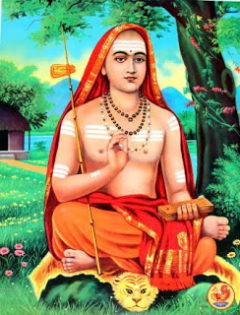
Sri Sri Adi Shankaracharya, the renowned, venerated saint, who spread the teachings of Advait Vedant all across the Indian Subcontinent. image source: Google
Now, there is a proper distinction between belief in one God, and the worship of 1 God. Belief in 1 God means both having faith in one God and worshipping one as well, whereas the worship of one God may most certainly imply the faith and belief in multiple Gods and Goddesses, with a special place for one particular God. And then Vaishnavites and Shaivites are not monotheists, they are similar to henotheists, which are people who have unconditional bhakti and unbridled love for one item God, but without rejecting or disrespecting any other God or Goddess. They absolutely love and respect other Gods too, merely 1 in particular holds a dear significance to them, and He is their Brahman.
Furthermore, I had earlier talked about the oneness to the implication of the terms "religious" and "spiritual" in the Hindu context, and that is because there are some Hindus who confuse Hindu rituals and customs as mere outward, outside displays of superficial faith. Notwithstanding, this is quite untrue. To paraphrase Sri Aurobindo, the rituals and physical traditions of the Hindu organized religion and the iconographical symbology are all awakenings and veneration of the divine. The divine resides in everything, everything is divine. Hence, that ritual, which some very conveniently disparage equally a mere outside show, is actually the appreciation and extension of the love us Hindus have for our beloved Gods and Goddesses and their all-encompassing divinity, and moreover, rituals are a part of the visual dazzler of our multi-hued civilization, and instead of because them burdensome, we must hold them close to our hearts. Therefore, the so-chosen "ritualistic" aspect of Hinduism has a divine significance, and so does the tranquil, soul-soothing meditation. The organized religion and spiritual have no such demarcations betwixt them both, as both imply the same notion- the pursuit of Divinity.
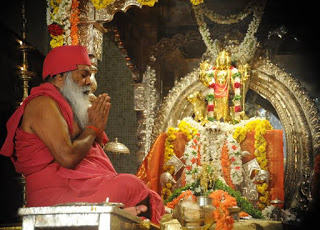
Our Hindu rituals are an intrinsic element of our civilization, and we should honour and revere them with all our hearts. Epitome source: Pinterest
And so finally, I'd like to say, that we are the sole survivors of a heritage millennia old, and must do everything to relieve every piffling chemical element of its beauty.
Featured paradigm courtesy: Left image of Hindu pantheon of deities – a click by Manoshi Sinha from Kapileswar temple Bhubaneshwar and correct image of aarti from IndiaMart.
This article was first published at the author's personal blog divyanshisharda.blogspot.com.
Disclaimer: The views expressed here are solely of the author. My India My Glory does not presume whatever responsibleness for the validity or information shared in this article by the author.
The following ii tabs change content below.
- Bio
- Latest Posts
![]()
Divyanshi Sharda is a humanities educatee who bears a keen interest in researching and analysing the various aspects of Indian Civilisation, History and Hinduism.
![]()
Comments
Source: https://www.myindiamyglory.com/2020/06/13/polytheistic-hindu-identity-a-heritage-of-divine-enlightenment/
Post a Comment for "What Impact Might Hindu Polytheism Have Had on the Development of Indian Art?"